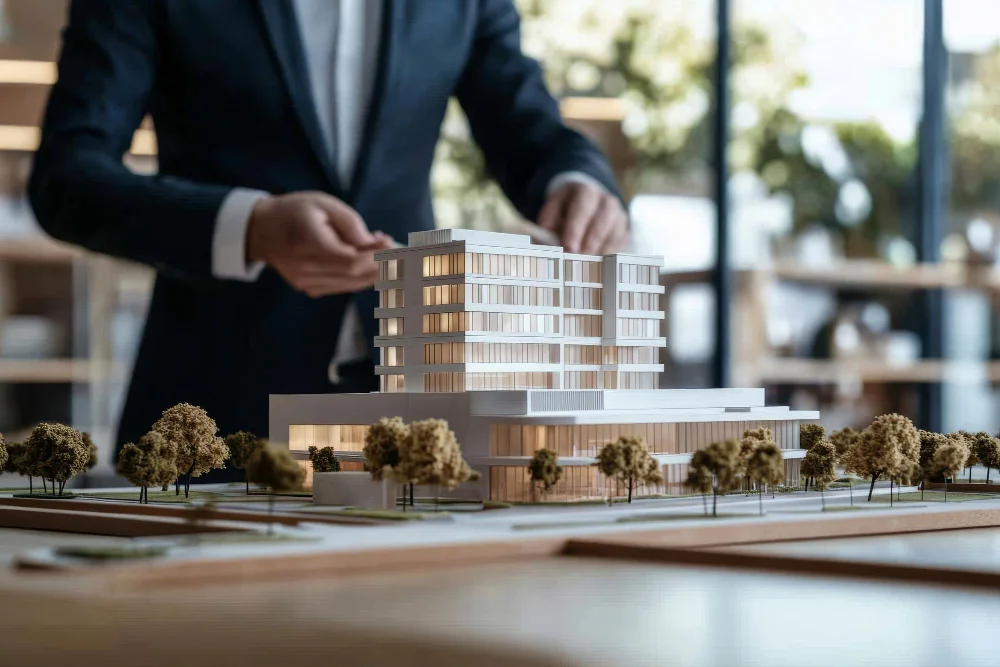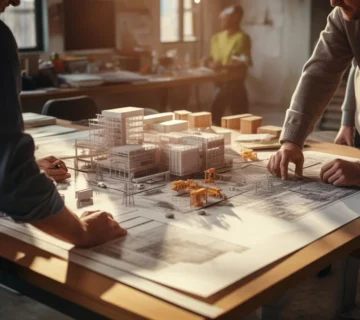Stages of Real Estate Development
1. Market Analysis and Planning
The first step involves analyzing the market to study demand for specific types of properties (e.g., housing or office spaces), local price trends, and economic factors affecting the project. Proper planning at this stage is crucial for setting project goals and ensuring the property’s attractiveness to investors and buyers.
2. Choosing the Right Location
The location is a key factor in any real estate project’s success. Developers select sites near transportation, amenities such as schools and hospitals, and employment centers. The site should have growth potential and an increasing value over time, ensuring high returns on investment.
3. Architectural Design and Engineering Planning
After selecting the location, architects and designers create engineering designs. These must comply with local building regulations and be both practical and appealing to users. Collaboration between developers and engineers ensures efficient space utilization and meets potential clients’ needs.
4. Project Financing Management
Real estate projects require significant funding, often sourced from bank loans or investors. Developers prepare a detailed feasibility study to convince investors or financial institutions of the project’s viability and high return potential.
5. Execution and Construction
Once all necessary permits are obtained, the construction phase begins. This involves coordinated efforts among contractors, material suppliers, and developers to ensure adherence to the budget and timeline.
6. Marketing and Promotion
As the project nears completion, marketing efforts begin to attract potential buyers or tenants. Promotion involves advertising campaigns, project tours, and leveraging online platforms and social media to highlight the property’s advantages and facilitate sales or leases.
7. Post-Development Property Management
Some developers continue managing the property after selling or leasing it, ensuring maintenance and necessary repairs. Continuous management helps maintain property value and enhance tenant or owner satisfaction.
Factors for Success in Real Estate Development
- Detailed Feasibility Study: Covering all financial and commercial aspects.
- Optimal Location Selection: A prime location attracts potential clients and increases property value.
- Good Design: Attractive and functional designs boost property appeal and project value.
- Effective Marketing: Innovative strategies to reach target audiences.
Benefits of Real Estate Development
- Investment Returns: Increasing property value generates substantial profits.
- Infrastructure Improvement: Projects enhance infrastructure and provide additional services.
- Job Creation: Direct employment opportunities in construction, marketing, and property management.
- Meeting Community Needs: Providing new residential and commercial spaces for local communities.
Challenges in Real Estate Development
- Financial Risks: Projects may face financial difficulties due to market changes or rising costs.
- Permits and Regulations: Local laws and regulations can be obstacles, requiring all necessary permits.
- Economic Fluctuations: Market volatility can affect project value and returns.
- Maintaining Quality: Balancing material quality and cost is crucial for sustainability and long-term satisfaction.
Conclusion
Real estate development is not merely about constructing buildings; it is a strategic process requiring a balance of risks and rewards. Key factors such as location selection, good design, and proper financing are essential for a project’s success. Despite the challenges, the investment returns make real estate development an attractive option for investors seeking long-term profits while serving the community.




لا تعليق